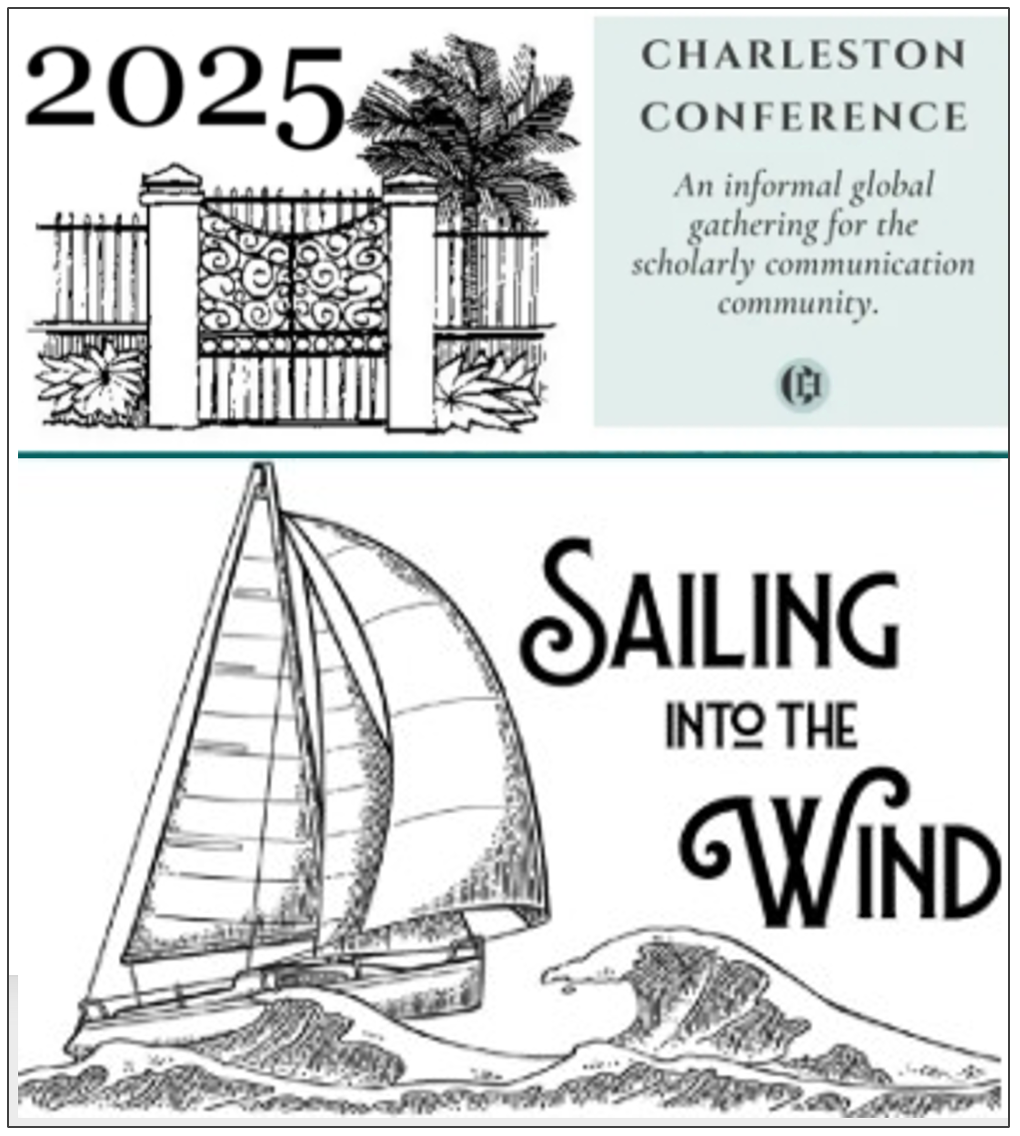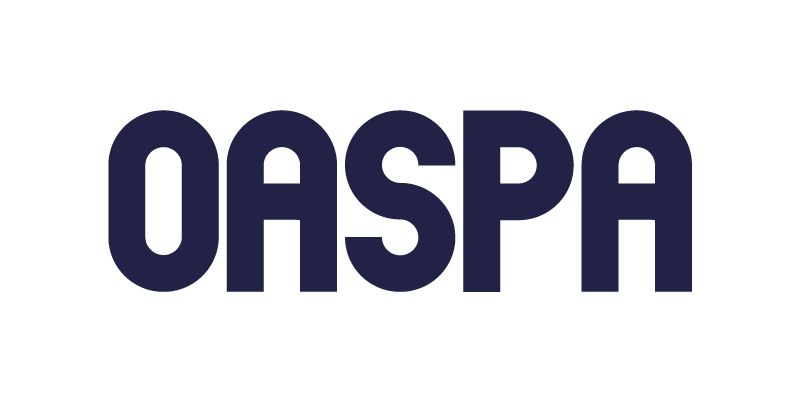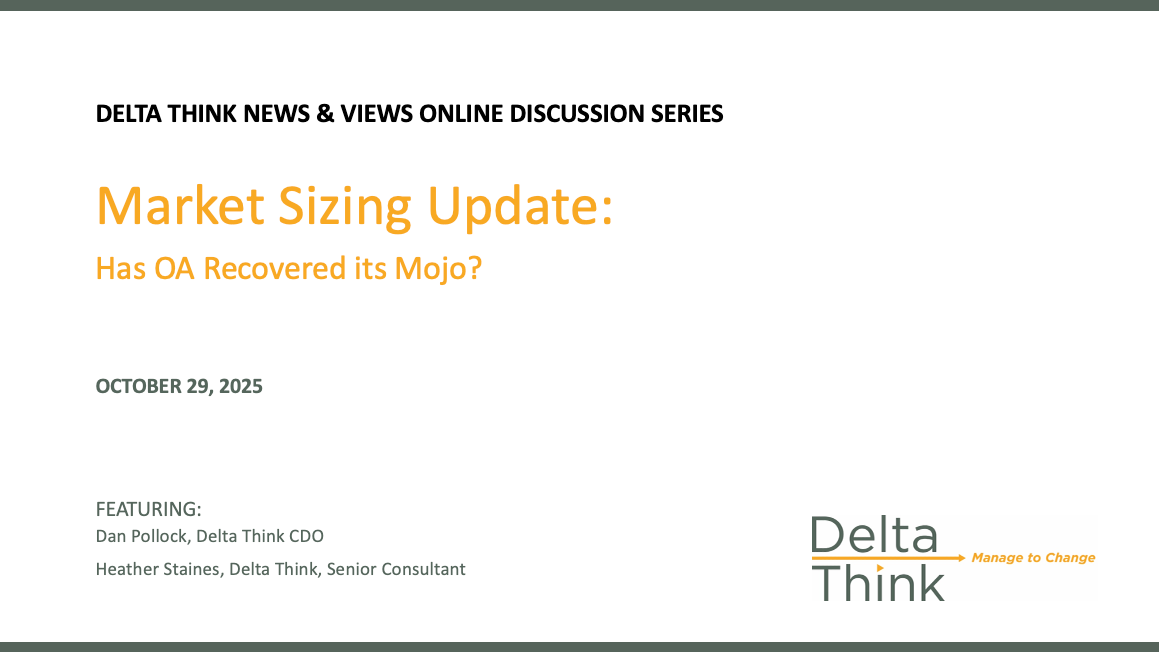Charleston Conference 2025 Reflections

Navigating Uncertainty, Innovation, and the Winds of Change
As the Charleston Conference 2025 wrapped up, one thing was clear: scholarly communication continues to evolve against a backdrop of uncertainty: economic, technological, and policy-driven. Yet amid the turbulence, conversations throughout the week pointed toward resilience, adaptability, and even optimism. As Tony Hobbs observed during the Shifting Tides policy session, “the good news for scholarly communication is that due to technology advances, it is now possible to sail into the wind.”
The Elephant in the Room: Doing More with Less
Heather Staines
Every conversation I had in Charleston seemed to circle back to one thing: budgetary uncertainty. Whether the concern was policy changes like potential caps on overhead or shifting grant funding or the ripple effects of declining enrollment, both domestic and international, everyone was asking how to do more with fewer resources. This theme ran through the plenary Leading in a Time of Crisis, Reclaiming the Library Narrative, and even the lightning sessions, a shared recognition that we’re all trying to redefine what “enough” looks like.
What stood out was how data-driven decision-making has become essential. Libraries, publishers, and service providers are not just analyzing what to add, but what to let go of, all in an effort to find a new balance.
And then there’s AI. We have moved beyond “sessions about AI” to “AI everywhere.” I will admit that I once thought AI was a solution in search of a problem, but now it’s woven through nearly every conversation. Librarians are leading the way on AI literacy, while publishers and service providers are using AI to innovate to meet changing research needs. The uncertainty is real but so is the shared determination to adapt, learn, and move forward together.
The Long Arm of the Law and Its Reach into Scholarly Communication
Meg White
One of the things I love about Charleston is that there is always a moment that challenges me to reframe how I think about the work we do. This year’s Long Arm of the Law session did exactly that. It was a vivid reminder that the legal and policy currents swirling around us are not abstractions; they shape our ecosystem in ways we can’t afford to ignore.
Paul Rosenzweig set the stage with a fascinating and lively walk through the history of executive orders. Hearing that Washington issued just eight while later presidents relied on them more frequently primarily to advance political agendas made the evolution very real. What stood out was the fine line between legitimate executive authority and overreach, and how easily those boundaries can blur.
Nancy Weiss then brought the conversation directly into our lane with her analysis of an Executive Order directing the Institute of Museum and Library Services (IMLS) to reduce its activities to the bare legal minimum. Her experience as former General Counsel gave us an inside view of what such a directive could mean for libraries, museums, and cultural programs, all places where so much of our community’s work takes root.
Sessions like this are why Charleston continues to be invaluable to me. They stretch my understanding, give me new context, and remind me that staying informed is part of how we navigate change together.
Data-Driven Insights: The 2025 Author and Researcher Survey
Lori Carlin
My week was cut unusually short (for me) by other meetings I had to fly off to, but I still managed to squeeze in 2.5 days of interesting sessions, discussions, and ‘business casual’ gatherings.
The first two events I attended this year were definite highlights, both of which were the brainchild of and brilliantly orchestrated by my colleague, Heather Staines – the Vendor Meetup on Monday evening and the Leadership Breakfast on Tuesday morning. Both were jam packed and filled with lively conversation. If you’re not familiar, the Vendor Meetup is an open, casual gathering (sponsored this year by Get FTR) designed to give vendor representatives, especially early career attendees, who attend only for Vendor Day a chance to socialize and network, something they often miss when they’re in and out in a single day, but all are welcome to attend! The Leadership Breakfast, a smaller invitation-only event designed to give a more intimate networking experience within the larger Charleston Conference, is always a thoughtful session centered on a pressing issue of the day, and this year was no exception. The discussion focused on sustainability across the entire scholarly communication ecosystem—from funders to libraries to publishers. Frankly, no one can unhear the words of one of the panelists (a library director) when he commented that his budget has dropped from ~$7M to ~$5.4M in the last 24 months … with more to come.
Finally, I’m a little biased, but I dare say I and my panelists were very pleased with the session I moderated focused on the impact of US research funding changes, which highlighted info from Delta Think’s Spring 2025 Author and Researcher Survey, along with how publishers who participated used the data to inform their strategies. We also had a librarian on the panel who informed the audience about the impact of these changes on universities overall and libraries in particular.
As you may know, the survey data showed rising concern about institutional support, with many researchers rethinking how they publish and participate in conferences. Respondents also described how tightening budgets are straining peer review and research dissemination, while responses varied sharply between U.S.-based and international authors, reflecting distinct policy and institutional pressures, it also showed that the impact is being felt globally.
In the tradition of Charleston, what made the session so powerful was the discussion. Colleagues from societies, publishers, and libraries focused on how they are using these insights to understand the challenges and to act on them. From adjusting publishing strategies to helping researchers to growing relationships in other markets, to shaping advocacy and outreach activities, organizations are using these insights to inform resource and budget direction in innovative ways. For me, that was the real takeaway: turning evidence into collaboration, and progress. Even in uncertain times.
We’re running the survey again now with plans to compare results to the Spring version. If you’re interested, there is still time to sign up!
End of An Era (Two, in Fact!)
This year’s conference marked a pivotal moment: the first without the in-person presence of founder, Katina Strauch (though we were grateful for her virtual participation), and the well-earned retirement of longtime Conference Director Anthony Watkinson, who rang his iconic bell one last time. We would not be here without them and their visionary colleagues who built this community from the ground up. Thank you, Katina and Anthony.
Charting What Comes Next
If there was one metaphor that captured Charleston 2025, it was motion; not adrift, but deliberate progress in the face of resistance. From policy updates to AI integration to the enduring strength of the scholarly community, the week’s sessions affirmed that innovation often takes root during uncertainty.
As Tony Hobbs reminded us, even headwinds can propel us forward — if we learn how to adjust our sails.













